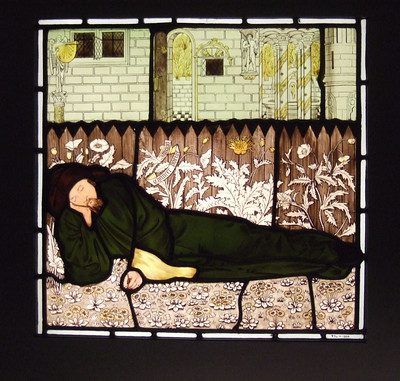(‘Chaucer Sleeping’. From stained glass panel series of The Legend of Good Women. Made by Morris & Co. 1963, designed by E.C. Burne-Jones, Victoria & Albert Museum London)
The pages on this website are designed to help students and teachers to read Geoffrey Chaucer’s works in their original Middle English. It includes:
- Concise descriptions of the grammar of Middle English
- Scholars of Chaucer reading passages from his poems as well as audio files providing guidance on the pronunciation of Middle English
- A brief biography of Chaucer
- A guide to reading the Canterbury Tales by Derek Pearsall
- A selection of Chaucer’s poems with interlinear translations into modern English
- A Glossarial Concordance to all of the works of Geoffrey Chaucer as well as John Gower’s Confessio Amantis
These pages were written by Christopher Cannon and Lucy Mookerjee relying on materials prepared by Larry Benson (1929-2015), one of the most prominent Chaucerians of the 20th century. The database for the concordance and the code for its interface are the work of Mark Patton of the Sheridan Libraries of JHU.
Contact Us
Christopher Cannon : [email protected]
Lucy Mookerjee : [email protected]

